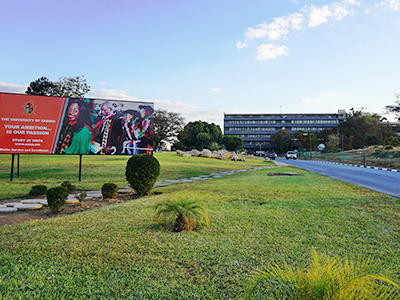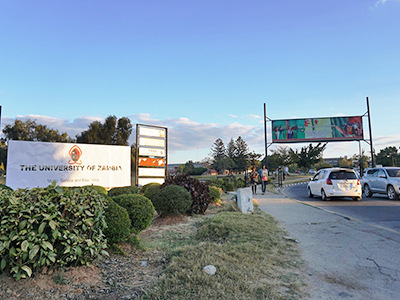On 18 June, Kyoto University and the University of Zambia (UNZA) signed an academic cooperation and exchange agreement, based on a proposal made by the KyotoU Center for African Studies (CAAS, or African Center) in cooperation with the Graduate Schools of Agriculture (GSA), Asian and African Area Studies (ASAFAS), and Global Environmental Studies (GSGES).
UNZA is a national university located in the capital city of Lusaka, where it was founded in 1966 with three schools: Education, Humanities and Social Sciences, and Natural Sciences. It has subsequently been expanded to cover Law, Agricultural Sciences, Mines, and several other fields.
Over the years, KyotoU and UNZA have developed an active academic partnership mainly in the fields of agricultural sciences and regional studies.
Since 2007, GSA's Professor Chieko Umetsu and Associate Professor Hitoshi Shinjo, the latter of whom is affiliated with GSGES as well, have been periodically hosting a workshop in Lusaka as part of their collaborative research with colleagues from Zambian institutes, each event attended by GSA faculty and graduate students and UNZA researchers.
Meanwhile, GSGES Assistant Professor Hidenori Harada and his collaborators at UNZA are exploring a sanitation planning approach that is participa tory and based on risk data, focusing on suburban Lusaka where the deterioration of sanitary conditions and high diarrhea rates are of serious concern.
At CAAS, the late Professor Emeritus Makoto Kakeya conducted long-term ecological anthropological studies in Mpika and Samfya in northern Zambia, beginning in 1990. Currently, Assistant Professor Shuichi Oyama, a geographer, is undertaking research and education activities in the country in coordination with the UNZA Institute of Economic and Social Research.
From 2002 to 2006, ASAFAS and the Center for Southeast Asian Studies (CSEAS) implemented an area-studies project entitled "Aiming for Center Of Excellence of Integrated Area Studies: Establishing Field Stations in Asia and Africa to Combine Research Activities and On-Site-Education ", with support provided by the science ministry MEXT under the 21st Century Centers for Excellence (COE) Program. This resulted in numerous field stations opening across each region, including one in Lusaka, established in 2003 to serve as a base for fieldwork in southern Africa.
UNZA became the 12th African university to sign an academic exchange agreement with KyotoU. This partnership is anticipated to enable Kyoto University to enhance its southern African research-hub network, and help its researchers undertake fieldwork more smoothly and extensively in the region, potentially leading to further opportunities for student exchange and research collaboration with local institutions.

One of the University of Zambia campuses

Another part of the UNZA campus





